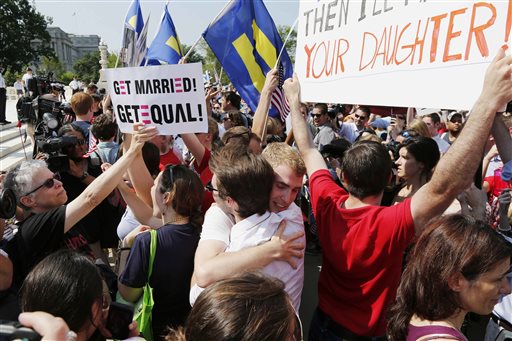The Justices may have wished to avoid the problems that still plague Roe v. Wade forty years later, but it is clear the Supreme Court’s rulings on the Defense of Marriage Act (DOMA) and California’s Proposition 8 will further polarize our politics. The Justices wisely avoided prescribing for the states what marriage should be, but problems in the way the decisions were made will further deepen the national divide.
Justice Anthony Kennedy’s attacks on the motivations behind DOMA, in his opinion for the majority of the Court, are both inaccurate and gratuitous. The Catholic News Agency summed up the objections of traditional marriage supporters: “The majority opinion in DOMA makes the claim that those who support the law do so in order to ‘disparage,’ ‘injure,’ ‘degrade,’ ‘demean’ and ‘humiliate’ gay individuals.”
As Rush Limbaugh wryly pointed out Wednesday, the Court is accusing then-President Bill Clinton of bigotry.
The reality is that many, if not most, supporters of traditional marriage do so out of a sincere reverence for the institution, not the desire to oppress those who live differently. As Justice Antonin Scalia pointed out in his dissent, the Court’s arguments provide armor-piercing ammunition against traditional marriage supporters.
In the Proposition 8 decision, the Court effectively endorsed a decision by the governor and attorney general of California not to fulfill their duty to defend a referendum passed by the majority of the voters. Justice Kennedy, this time writing for the dissent, observed that the Court had left proponents of Proposition 8 at the mercy of the same state officials that California’s citizen initiative system had been designed to overrule.
Effectively, the ruling means that government officials can no longer be expected to enforce the law in a nonpartisan manner. Supporters of ballot initiatives know that they cannot merely hope to persuade a majority of the people to support a referendum–they must also hope to persuade a majority to elect politicians who support the referendum.
This debate, and others, must now take place in the realm of partisan politics.
Those of us who support traditional marriage but are tolerant of gay lifestyles, and who accept gay marriage when it is the outcome of the democratic process, are all but rendered voiceless by the Court’s decisions.
Even those who are cheered by the rulings should consider the cost: the immense power placed in the hands of state government at the expense of the people, and the reinforcement of today’s hyperpartisan debate.

COMMENTS
Please let us know if you're having issues with commenting.